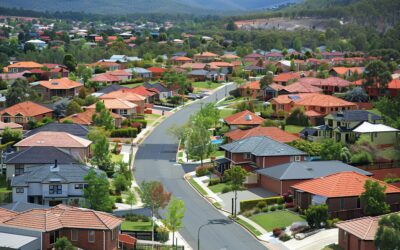Rents continued rising in 2024, with the national median rent climbing 4.8% over the year, according to CoreLogic. That included increases of 6.2% in the combined regions and 4.3% in the combined capital cities.
Among the capitals, Perth led the way with 8.1% growth, followed by Adelaide with 6.7% and Hobart with 6.0%.
But while rents increased further during 2024, a lot of heat disappeared from the market over the course of the year, with the pace of rental growth falling to its lowest level since March 2021.
CoreLogic economist Kaytlin Ezzy said affordability had become “a significant drag” on rental growth. Between the start of the pandemic in March 2020 and December 2024, the national median rent had increased 36.1%, equivalent to a rise of $171 per week or $8,884 per year, stretching renters’ budgets to the limit.
“The net result has potentially seen some prospective renters delay their decision to leave the family home, while others have looked to form larger share households as a way of distributing the additional rental burden, unwinding the previous shrinking in the average household size that was apparent through the early stages of covid,” she said.
This shift to larger households was reflected in increased demand for houses (which recorded a median annual rental increase of 5.0%) compared to units (4.2%).
Ms Ezzy said the rental market had also been affected by a change in the balance between supply and demand.
On the demand side, there was a slowdown in migration, which meant there were fewer people fighting for rental accommodation. On the supply side, there was an increase in investor activity, which meant more rental stock became available.
“Together these factors have supported an easing in vacancy rates over the year, from a low of 1.4% in November 2023 to 1.9% at the end of 2024,” Ms Ezzy said.
While the rental boom has eased for now, many property investors are still doing well, given that vacancy rates remain low and rents continue to rise in many parts of the country.
Licensing statement: Rayne Finance ABN [70 605 100 838] is authorised under LMG Broker Services Pty Ltd Australian Credit Licence 517192. Disclaimer: (1) As with any financial scenario there are risks involved. This information provides an overview or summary only and it should not be considered a comprehensive analysis. You should, before acting in reliance upon this information, seek independent professional lending or taxation advice as appropriate and specific to your objectives, financial circumstances or needs. This publication is provided on the terms and understanding that: (2) LMG Broker Services Pty Ltd, Rayne Finance (Seed Lending Pty Ltd) and the authors, consultants and editors are not responsible for the results of any actions taken on the basis of information in this publication, nor for any error in or omission from this publication. (3) LMG Broker Services Pty Ltd, Rayne Finance (Seed Lending Pty Ltd) and the authors, consultants and editors, expressly disclaim all and any liability and responsibility to the maximum extent permitted by the law to any person, whether a purchaser or reader of this publication or not, in respect of anything, and of the consequences of anything, done or omitted to be done by any such person in reliance, whether wholly or partially, upon the whole or any part of the contents of this publication.
Explore other FAQs and Facts
2025 Money Moves:
Tips for Homeowners, Buyers, and Business Owners
The new year presents an ideal opportunity to reassess your finances. Whether you’re planning to buy property, managing a home loan, or running a business, there are key actions you can take to improve your financial situation. From enhancing your credit score to exploring refinancing options, small changes can make a big impact.
How the property market looks as we head into 2025
Australia’s property market is shifting, with a clear divide between strong and weak performers. While Brisbane, Perth, and Adelaide see robust growth, Sydney, Melbourne, Canberra, and Hobart face slower gains. As interest rate cuts loom in 2025, understanding regional trends will be essential for buyers and investors alike.
December cash rate on hold: 6 reasons to be optimistic about 2025
The Reserve Bank of Australia has kept the cash rate on hold once again, maintaining its cautious stance. While hopes for a rate cut remain unfulfilled, there are six reasons to stay optimistic, even as inflationary pressures and low productivity continue to shape the RBA’s approach to economic stability.
Australian properties see record profits in 2024
The 2023-24 financial year marked a milestone for Australian property sellers, with 96% of houses sold nationwide yielding a median profit of $326,000. This trend reflects the long-term value growth of homes, with capital cities and regional areas both benefiting from a robust market and rising property prices.
The pros and cons of rentvesting
With housing prices up 37.8% since 2020, many Australians face tough choices between renting in desirable suburbs or buying further from city centres. Rentvesting offers a middle ground—renting where you want to live while investing in an affordable property. This approach can build wealth but requires careful financial planning.
5 reasons why this might be a great time to buy
With Australia’s property market cooling, some may see now as an opportune time to buy. While timing the market is tricky, reduced competition, rising rental prices, and potential long-term gains could make this a strategic moment for both first-home buyers and investors to consider entering the market.
How to consolidate tax debt
Struggling with ATO tax debt? If you miss payments, the ATO may charge 11.36% interest on unpaid amounts. One option is to consolidate your tax debt into your home loan, potentially saving on interest, though refinancing costs apply. Speak with a mortgage broker to explore this option and avoid further penalties.
How is interest calculated on my home loan?
Mortgage interest is calculated daily based on the remaining principal, but the reduction of the principal isn’t linear. In the early years, a larger portion of each payment goes toward interest. However, by making additional repayments or using an offset account, you can reduce the principal faster and pay less interest over the life of the loan.
How do green home loans work?
As Australians seek to minimise their carbon footprint, green loans are becoming popular. These loans finance energy-efficient homes, renovations, and eco-friendly products like solar panels, EVs, and insulation. With potentially lower rates and flexible terms, green loans also boost property value, as sustainable homes attract more views and sell faster.
Dream Home Dilemma: Should You Build or Buy your home?
Deciding whether to build a new home or buy an established one is a major step in your homeownership journey. Each choice has its own set of pros and cons, from the opportunity to customise your space to the convenience of moving into an existing home. Understanding these differences can help you make the best decision for your future.














